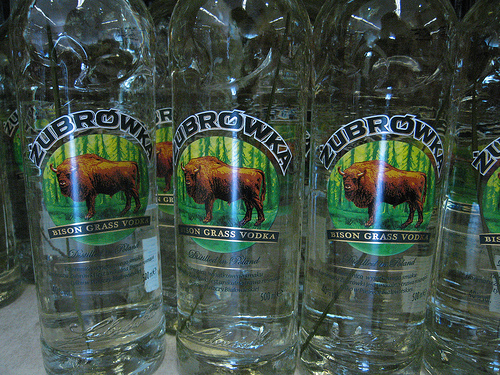Cases in Polish: Nominative Posted by Anna on Jun 3, 2008 in Grammar
 Because Polish nouns have seven (yep, you read that right – SEVEN!) cases, covering all of them in just one entry would be a bit of an overkill. To make it easy for all (but especially for me!), we’ll do them on a case-by-case basis.
Because Polish nouns have seven (yep, you read that right – SEVEN!) cases, covering all of them in just one entry would be a bit of an overkill. To make it easy for all (but especially for me!), we’ll do them on a case-by-case basis.
But first things first. What is a “case” anyway?
(Warning! Warning! Boring grammatical stuff ahead!!!)
In Polish, as in other Slavic languages, certain words such as nouns, adjectives and pronouns change their endings. And just how a certain word changes is not random, but depends on its role in a sentence. This complicated process is called declension, because the words “decline” to show “case”. Confused yet? I am! I never liked grammar…
So, let’s start with the easiest case of all – the NOMINATIVE case (in Polish – MIANOWNIK). That’s the basic noun, just as it appears in a dictionary. And that’s the case you use when a noun is the subject of a sentence.
For example, take one of the most beloved Polish drinks – Żubrówka. If you want to explain to someone what Żubrówka is, you’d make a simple sentence like this one:
Żubrówka is a type of vodka.
And in Polish:
Żubrówka jest rodzajem wódki.
As the subject of the sentence, Żubrówka doesn’t acquire any funky endings. It stays the same. See? Easy peasy! It’s the other nouns that changed, but we’ll discuss those particular cases another time. Instead, I’m sure you’d like to know more about this vodka, right?
The name Żubrówka comes from the word “żubr”, which is Polish for “European bison”, also known as wisent. A hundred years ago, those mighty creatures were almost extinct – the last wild bison was shot in Poland in 1919. In the 1920s less than 50 animals remained, all of them in zoos.
After a carefully designed breeding program, the first bison were successfully re-introduced into the wild in the 1950s. Now, there are about 3000 of them roaming the Białowieża National Park. Unfortunately, the Park is divided with a guarded security fence on the border between Poland and Belarus. Which is also the border between the European Union and The Rest Of The Known Universe. Because of that, Polish bison can’t mingle with their Belarusian pals, and that sadly, can have rather unpleasant consequences for their gene pool.
So what does all this have to do with vodka? Well, those bison munch on a very special grass, often called “bison grass”, but more commonly known under its Latin name of Hierochloe odorata. And it just so happens that this grass is the magical ingredient responsible for Żubrówka’s particular taste, aroma, and yellowish color. And that’s why you may know Żubrówka as Bison Grass Vodka.
I think learning Polish cases with the help of genuine Polish vodka won’t be all that hard after all!

Build vocabulary, practice pronunciation, and more with Transparent Language Online. Available anytime, anywhere, on any device.




Comments:
Ai:
Now i know more about zubrowka:-)
Fran Turner:
Hi Anna,
I have been studying Polish for a few months and just thought to check for blogs on the web. Yours is really helpful and easy to read. While trying to figure out Polish cases, I wrote a little poem. If you like it, you may share it.
In Case of Polish
The Polish language is quite curious.
Seven cases! Yes, they’re serious.
The Nominative Case is so exquisite.
Answers the question: who or what is it?
If there’s few or even many,
Or you tell me there’s not any,
Look for something that’s a possession.
Carefully listen for a preposition
Od, ze, do, dla, or koło
Genitive case does a solo.
Now I know it sounds amusing
To what, to whom – it’s just confusing!
But if you listen to the help I give,
I lend to you this case of Dative.
I see I need to get going soon
Of course, I’d like to fly to the moon
Just remember when passing through
That any old direct object will do
And action or motion to anyplace
Always results in the Accusative case.
Whether in front or behind, above, under or below
There’s one more thing that you need know
Transportation is fundamental
When the case is Instrumental
Although it may seem quite apparent
About “on”, “in”, “by”, or “after” it is inherent
That these are prepositions of locations.
(I thank you now, for your patience.)
We’ve arrived at the case called Locative
And all that’s left – hey you! Vocative!
By Polish learner
Frances Turner
Anna:
Hi Fran!!!
Wow!!! This is BRILLIANT!!! Next week I was going to continue with the cases, and I’d love to include your poem! Thank you so much! 🙂
c hawkins:
I’m looking for other stuff like this.
Danielle:
hi anna, i love reading your blog, it is easy to read and the way you include vocabulary without including too much makes a hard language like Polish much easier. and Fran, your poem made cases even easier (even though i’m still confused on what the endings change into).